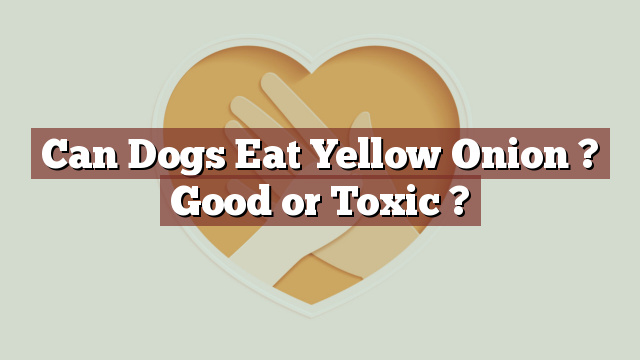Can Dogs Eat Yellow Onion? Good or Toxic?
As responsible pet owners, it is crucial for us to be aware of the foods that are safe for our furry companions. Dogs have different dietary needs compared to humans, and certain foods that are harmless to us can be toxic to them. One such food that often raises questions is yellow onion. In this article, we will explore the nutritional value of yellow onion, discuss its safety for dogs, and provide guidance on what to do if your dog consumes it.
Nutritional Value of Yellow Onion: Vitamins, Minerals, and More
Yellow onions are widely used in various culinary dishes, thanks to their distinct flavor and aroma. They are packed with several essential nutrients that are beneficial for human health. Yellow onions are a good source of vitamins C and B6, as well as minerals such as potassium and folate. Additionally, they contain antioxidants that help protect the body against free radicals.
Can Dogs Eat Yellow Onion? The Truth about Safety and Toxicity
Can dogs eat yellow onion? The answer is a resounding no. Yellow onions, along with other varieties of onions and garlic, are highly toxic to dogs. They contain compounds known as thiosulphates, which can cause oxidative damage to a dog’s red blood cells. This can lead to a condition called hemolytic anemia, where the body is unable to produce enough healthy red blood cells.
Numerous scientific studies and veterinary insights have confirmed the toxicity of onions in dogs. Even a small amount of onion can be dangerous and potentially life-threatening for our furry friends. It is always better to err on the side of caution and avoid feeding yellow onions to dogs altogether.
Potential Risks and Benefits of Feeding Yellow Onion to Dogs
Feeding yellow onions to dogs can have severe consequences. The consumption of even small quantities of onions can lead to symptoms such as vomiting, diarrhea, abdominal pain, weakness, and pale gums. In more severe cases, it can cause difficulty in breathing, rapid heart rate, and collapse.
On the other hand, there are no known health benefits of feeding yellow onion to dogs. While humans may enjoy the taste and nutritional benefits of onions, it is important to remember that dogs have different digestive systems and metabolisms. What may be safe and healthy for us can pose a serious risk to their well-being.
My Dog Ate Yellow Onion. What Should I Do? Steps to Take
If you suspect that your dog has consumed yellow onion, it is crucial to take immediate action. Contact your veterinarian and describe the situation in detail. They will be able to provide you with the appropriate guidance based on your dog’s size, the amount ingested, and any symptoms they may be experiencing.
In some cases, the veterinarian may induce vomiting to remove the onion from your dog’s system. They may also recommend activated charcoal to help absorb any remaining toxins. It is essential to follow their instructions carefully and monitor your dog closely for any changes in behavior or health.
Conclusion: Yellow Onion and Dogs – Proceed with Caution
In conclusion, it is important to remember that yellow onions, and all other varieties of onions, are toxic to dogs. The compounds found in onions can lead to serious health issues, including hemolytic anemia. It is best to avoid feeding yellow onions to dogs altogether and be cautious when preparing meals that may contain this ingredient.
If you suspect your dog has consumed yellow onion, consult your veterinarian immediately. They will be able to provide you with the necessary guidance and treatment options. As responsible pet owners, it is our duty to prioritize our dogs’ well-being by staying informed about foods that are safe for them to consume.
Thank you for investing your time in exploring [page_title] on Can-Eat.org. Our goal is to provide readers like you with thorough and reliable information about various dietary topics. Each article, including [page_title], stems from diligent research and a passion for understanding the nuances of our food choices. We believe that knowledge is a vital step towards making informed and healthy decisions. However, while "[page_title]" sheds light on its specific topic, it's crucial to remember that everyone's body reacts differently to foods and dietary changes. What might be beneficial for one person could have different effects on another. Before you consider integrating suggestions or insights from "[page_title]" into your diet, it's always wise to consult with a nutritionist or healthcare professional. Their specialized knowledge ensures that you're making choices best suited to your individual health needs. As you navigate [page_title], be mindful of potential allergies, intolerances, or unique dietary requirements you may have. No singular article can capture the vast diversity of human health, and individualized guidance is invaluable. The content provided in [page_title] serves as a general guide. It is not, by any means, a substitute for personalized medical or nutritional advice. Your health should always be the top priority, and professional guidance is the best path forward. In your journey towards a balanced and nutritious lifestyle, we hope that [page_title] serves as a helpful stepping stone. Remember, informed decisions lead to healthier outcomes. Thank you for trusting Can-Eat.org. Continue exploring, learning, and prioritizing your health. Cheers to a well-informed and healthier future!

